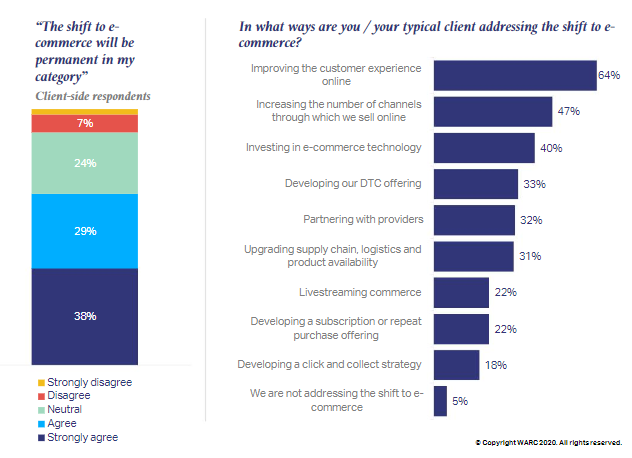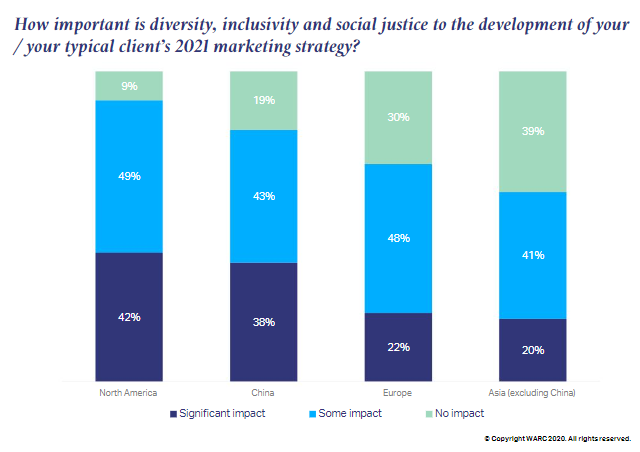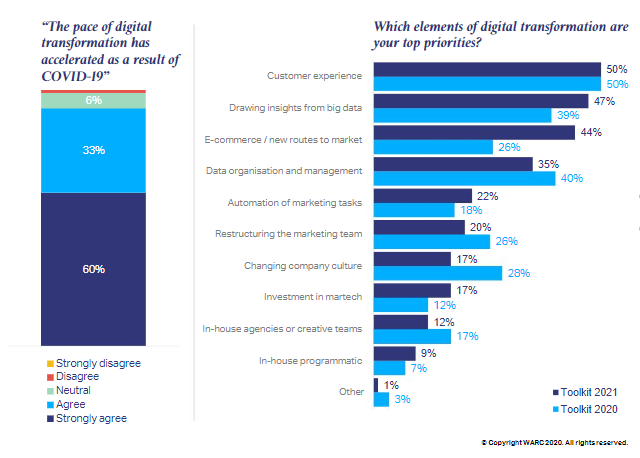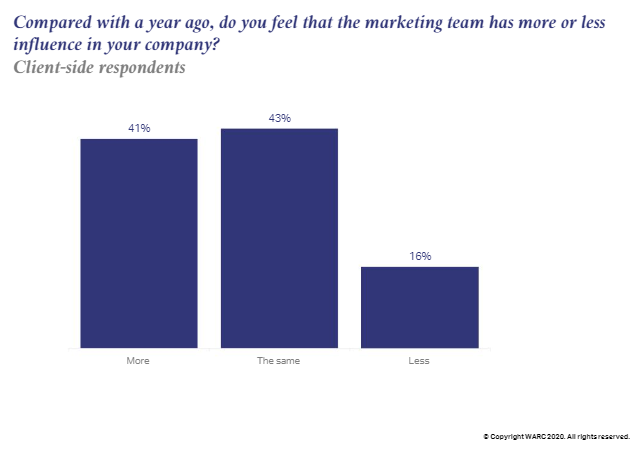Marketing in the COVID-19 crisis
This article is part of a special WARC Snapshot focused on enabling brand marketers to re-strategise amid the unprecedented disruption caused by the novel coronavirus outbreak.
With the COVID-19 pandemic having wreaked havoc on 2020’s best-laid plans, marketers are now taking stock and looking ahead. The pending arrival of a reliable vaccine is reason for optimism after a year of chaos and unpredictability, but with the economic impact of the pandemic only now setting in, the pain is far from over. Tackling the challenging times ahead will take more creativity and strategic nous, but marketing leaders are ready to step up once more.
As part of WARC’s tenth annual Marketer’s Toolkit, released at the end of November 2020, more than 20 leading CMOs spoke exclusively with WARC about this most extraordinary year, and the challenges and opportunities their brands face in 2021.
When speaking with CMOs, as WARC often does, it is often a surprise to learn that many brands are facing the exact same issues, regardless of the size of the business, country, or category it operates in. This year’s Marketer’s Toolkit interviews were no different.
Here are some of the key themes marketing leaders shared with WARC that they believe will define the next twelve months.
You can read all 22 CMO interviews for the WARC Marketer's Toolkit 2021 in full here.
E-commerce and digital experiences are major priorities in 2021
E-commerce has been super-charged by the pandemic, especially as brick-and-mortar retailers have been shuttered by ongoing lockdowns. Likewise, digital experiences – such as online fitness classes and concerts – have drawn in entirely new audiences for brands.
It is time to think beyond a short-term ‘band-aid’ for booming online demand and rethink the role of e-commerce as central to the overall customer journey, according to Conny Braams, Chief Digital and Marketing Officer at Unilever.
“On e-commerce, you need to really think about it end to end: what does it mean for your portfolio, but also for your price, product, promotion, or place? For your content creation, media strategy, analytics and supply chain?” Braams said in an exclusive interview with WARC.

Source: WARC Marketer’s Toolkit 2021
For brands that already had an e-commerce strategy or were offering digital experiences, adapting to 2020’s accelerated demands meant scaling up existing infrastructure or re-thinking engagement on mobile or social channels.
“Livestreaming was one we turned on quickly – we ended up with thousands more touchpoints with customers than before,” said Anna Henwood, CMO of Les Mills International, a global fitness brand focusing on group classes.
But for those brands that didn’t have already have those pieces in place, there is a now a real risk of falling behind competitors as new behaviours become permanent expectations of consumers in the post-COVID era.
“Depending on the industry, market leaders are probably doing even better than before with online sales because of mental availability,” noted Simon Peel, Global Director – Media at sportswear brand Adidas.
“Companies that were struggling before are probably finding the whole thing even more challenging.”
Being a good ‘brand citizen’ isn’t just important to consumers, it’s a moral obligation.
The resurgence of the Black Lives Matter movement in 2020 has underlined the need for brands to play an important role in challenging racism and a lack of diversity in the industry, according to the Chief Brand Officer of Procter and Gamble, Marc Pritchard.

Source: WARC Marketer’s Toolkit 2021
“The scourge of racism has literally been around for centuries; it's not like it’s brand new. I think many have just not faced it and dealt with it because it is hard. But it is inescapable this time, and people need to step up,” he said in an exclusive interview with WARC for the Marketer’s Toolkit.
Likewise, Patagonia – a outdoors brand long associated with environmental activism – acknowledged that its political platform has become “even more prescient and important” in 2021, according to the brand’s Marketing Director in Europe, Alex Weller.
Doubling down on the new marketing fundamentals
After binning plans multiple times in 2020, marketers are leaning into the fundamentals. Many are now benefitting from the groundwork done to grow the brand in better economic times, while unprepared competitors try to find their feet in an entirely new business climate.
“The work you did prior really determines how you get through something like this – that’s the big lesson for a lot of marketers,” said Brent Smart, Chief Marketing Officer at IAG Australia, in a conversation with WARC.
However, while the global ad market will take years to recover from COVID-19, many brands are taking this opportunity to think toward long-term growth outside of just advertising. For example, focusing on digital transformation, doubling down on data-driven insights and upgrading customer experience are top of mind in the year ahead.

Source: WARC Marketer’s Toolkit 2021
Brands are also looking toward challenger brands and start-ups for inspiration. In China, which is generally more digitally advanced than the West, beverages giant Wahaha is looking toward online brands for inspiration. “Many rising ‘internet-first’ brands [in China] offer ideas and measures that we can learn from,” said Cheng Gong, Deputy Director -Brand and Public Relations at Wahaha in her interview.
Marketers should act on their new-found influence in the C-suite
Most of the marketers that WARC spoke to for the Marketer’s Toolkit 2020 feel optimistic that COVID-19 will be a turning point for the influence of the discipline at a C-suite level, where marketers have typically struggled to make the impact of other business functions.

Source: WARC Marketer’s Toolkit 2021
“I am a big believer that this whole situation is going to make marketing, as a function, exponentially more relevant,” said Marcel Marcondes, US Chief Marketing Officer at Anheuser-Busch InBev, in his interview with WARC.
“Everybody's waking up to the fact that you might be consumer-centric as a company, but now the winners will be the ones that will adapt what they do to serve consumers better and faster,” he added
Marketing’s key role will be at the intersection of consumer insights, digital transformation and brand building – all key to the COVID-19 recovery.
“The executive team are desperate to hear insights of what's going on with consumers. We should look at that as a huge opportunity to reset the value that marketeers play in that boardroom,” said Melissa Hopkins, Chief Marketing Officer at Optus.
With light at the end of the tunnel, let’s hope for a steadier year in 2021.

